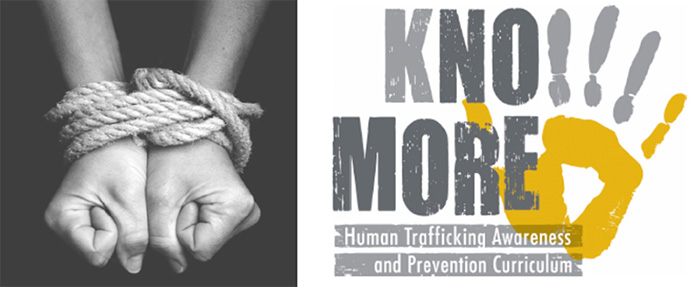
Raising Awareness of Human Trafficking on University Campuses
Published Date
By:
- Tiffany Fox
Share This:
Article Content

Logo for the new workshop series starting April 25 on raising awareness to combat human trafficking. RSVP here. Open to the public, admission free.
The International Labor Organization estimates that human trafficking generates over $150 billion in illegal profits each year, with more than one-third of that amount coming from forced labor exploitation, and the rest from sexual exploitation.
According to a recent report, San Diego is not immune to this crisis. Published by the University of San Diego’s Joan B. Kroc School of Peace Studies, the report estimates that the economic impact of sex trafficking in San Diego amounts to more than $750 million annually. Put in perspective, that sum is just below the economic impact of the natural resources and mining industries in San Diego, and slightly higher than the sale price of the Padres baseball team in 2012.
The disturbing statistics represent real victims -- including students from San Diego’s institutions of higher learning. Some of those students will share their harrowing stories about human trafficking at an event on the UC San Diego campus on April 25. The “kNOw More” program on human trafficking awareness and prevention is a curriculum designed specifically to resonate with young people. The workshop starts at 4PM on Tuesday, April 25 in the Great Hall of UC San Diego’s International House.

The Human Trafficking Awareness workshop will take place in the Great Hall of UC San Diego's International House.
The first in a six-part monthly series, the storytelling event features student actors who use dialogue, abstract dramatized images and spoken word to educate the public (ages 10 and up) about the red flags and vulnerabilities around human trafficking. The kNOw More program is based on the latest human trafficking research in San Diego, and it was created by the Center for Justice & Reconciliation at Point Loma Nazarene University in collaboration with experts from various sectors.
Naila Chowdhury, UC San Diego’s Director of Social Impact and Innovation (SII), based in the Qualcomm Institute, says that human trafficking on university campuses primarily takes the form of sexual exploitation. She recounted the story of one West Coast student who came to the U.S. from overseas to discover she had trouble finding the money for food and lodging. A friend offered to lend her money, but when she couldn’t repay it, the same ‘friend’ took the student to a hotel, where she was gang-raped by several men.
“These so-called ‘sugar daddies’ and buyers’ representatives are targeting students at universities, high schools and middle schools, and the cycle will continue until we collaborate and address it,” observed Chowdhury. “It has become a critical and tragic issue of our society, and now we want UC San Diego to be a lead champion both at the university level and in county schools. We want to create awareness in our campus community and to help students become defenders and ambassadors themselves in the effort to stop human trafficking.”
Suresh Subramani, a distinguished professor of molecular biology at UC San Diego, was instrumental in the creation of the Social Impact and Innovation effort that Chowdhury leads. He says awareness is critical. “Many students, staff and faculty may not be fully aware of human trafficking and even slavery in universities and schools,” said Subramani. “The goal of the kNOw More program is also to raise awareness of the role of the Internet in propagating this exploitation of vulnerable students, and to take proactive and preventive measures to eliminate the problem.”
The 90-minute program (including a Q&A session) is sponsored by the SII initiative in partnership with the Qualcomm Institute. Other campus partners include International House, Eleanor Roosevelt College and the Rady School’s Center for Social Innovation and Impact, with additional support from the Alliance4Empowerment.
"The Qualcomm Institute is supportive of initiatives that educate the campus community about global issues,” said QI director Ramesh Rao. “Many people think of human trafficking as something that affects only the developing world, but it's in our own backyard, and we think technology can be helpful in addressing it. Connections among people, such as the ubiquitous communications provided by social media, have a lot to offer in this regard."
Admission is free, and the event is open to the entire campus community and the public at large. Please RSVP at https://thesourceofchange.eventbrite.com.
Share This:
You May Also Like
Stay in the Know
Keep up with all the latest from UC San Diego. Subscribe to the newsletter today.


